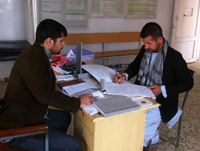Host training institution:
Highlights during MPH program:
Post-training highlights:
|  |
As a senior adviser in the directorate of policy and planning at Afghanistan’s Ministry of Public Health, Dr Muhammad Manochehr spends much of his time developing policy recommendations drawing on research evidence to address gaps in health services in his country. He cites the skills he acquired through TDR’s postgraduate training programme as key to being able to perform his current job. Prior to this training, Manochehr worked in Afghanistan’s national tuberculosis (TB) control programme as head of monitoring and evaluation and surveillance. TB is a major public health challenge in Afghanistan, with 47 406 case notifications in 2017, according to WHO. While working at the national TB control programme, Manochehr noticed the TB case notification rate rising, but had limited tools to address the problem in an effective way.
“I wanted to make a difference, but I didn’t have the skills to analyse the data or to conduct research that would help improve the programme,” he said.
This was the primary motivation for him to pursue a master’s in public health from the American University of Beirut (AUB), where many of Afghanistan’s leaders were educated, prior to Lebanon’s 15-year civil war.
AUB is one of seven universities TDR partners with to strengthen research capacity of scientists in low- and middle-income countries burdened with infectious disease of poverty. The American University of Beirut was particularly appealing for Manochehr, given that public health is taught in a context where conflict and forced migration are pervasive, as in Afghanistan.
Research on TB control among refugees and migrant workers
During his master’s programme in 2018, Manochehr particularly appreciated the coursework on statistical analysis of data and design and analysis of epidemiological studies. As part of the programme, he applied these skills to a research project on TB control in Lebanon, focusing on migrant workers and Syrian refugees.
There he found that there was a low notification rate of TB cases as many undocumented Syrian refugees and migrant workers were afraid of being deported if they sought medical care. So it was clear that this posed a barrier to accessing TB treatment.
As a result, the research led to the conclusion that community-based awareness programmes would be necessary to inform migrant workers that a TB diagnosis would not lead to deportation and that employers should also be educated on the treatment process.
Making a difference at home
Upon returning to Afghanistan, Manochehr was well equipped to take on the role of policy adviser at the Ministry of Public Health. One of his key responsibilities is developing evidence-based policies, policy briefs and plans of action.
Earlier this year, he developed a policy brief on expanding coverage of health services to underserved, remote areas in Afghanistan.
 Source: UNFPA Afghanistan | Currently, about 10% of the population live in such remote areas, more than two hours walking distance from the nearest health facility. To address this issue, the health ministry, in collaboration with UNPFA, introduced and piloted the Family Health House (FHH) model in 2009. The Family Health House is a community-based health facility established in areas that are a minimum of 10 km from the nearest health facility, covering a population of 1500 to 3000 people. The focus of these facilities has been to provide maternal and child health services. |
Manochehr’s policy brief highlighted an external evaluation of the Family Health House model, which showed it is more cost effective compared with other models of health care delivery. This allowed him to recommend the expansion of Family Health
Houses to cover all 10% of the underserved population.
Analysis of data from the Health Management Information System also suggested the need for HIV, TB and malaria care, prompting The Global Fund to support this expansion of services in 35 Family Health Houses, which will start this month.
“Given my background in TB control programmes, I felt it was very important to include these additional services,” Manochehr said. “It is very rewarding to see that this policy brief has made an impact.”
For more information, contact Ms Makiko Kitamura, TDR Communications Officer, email: kitamuram@who.int.

